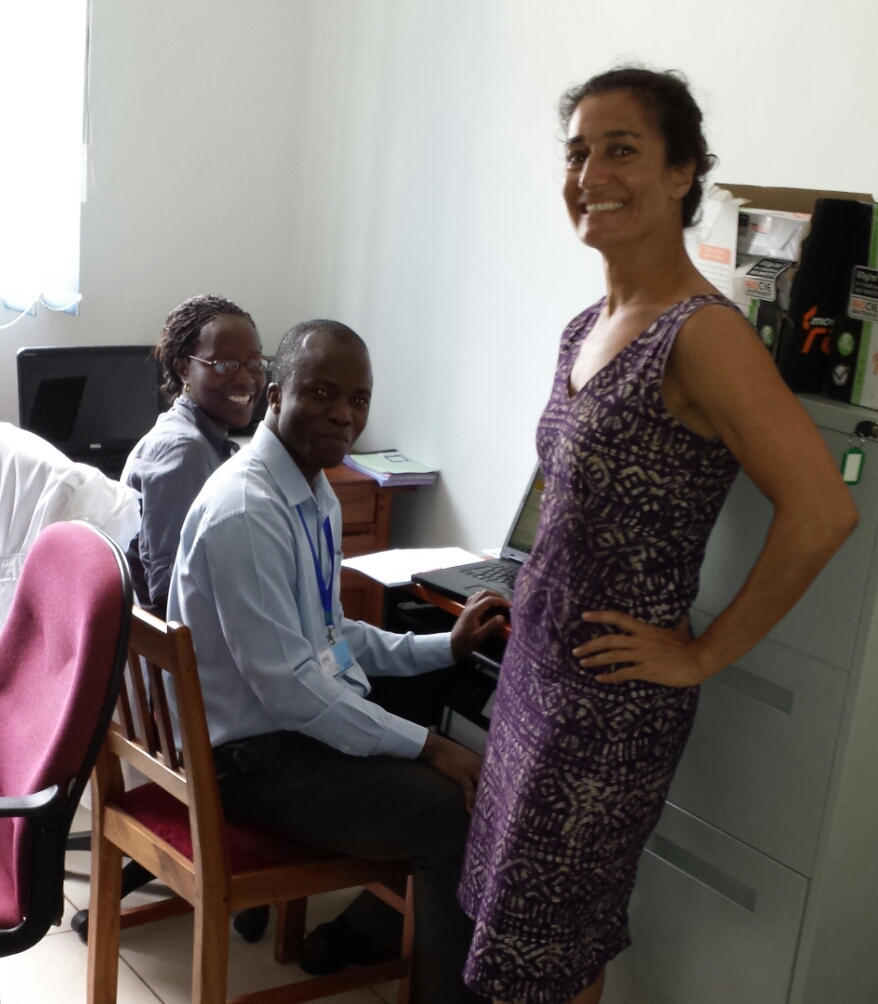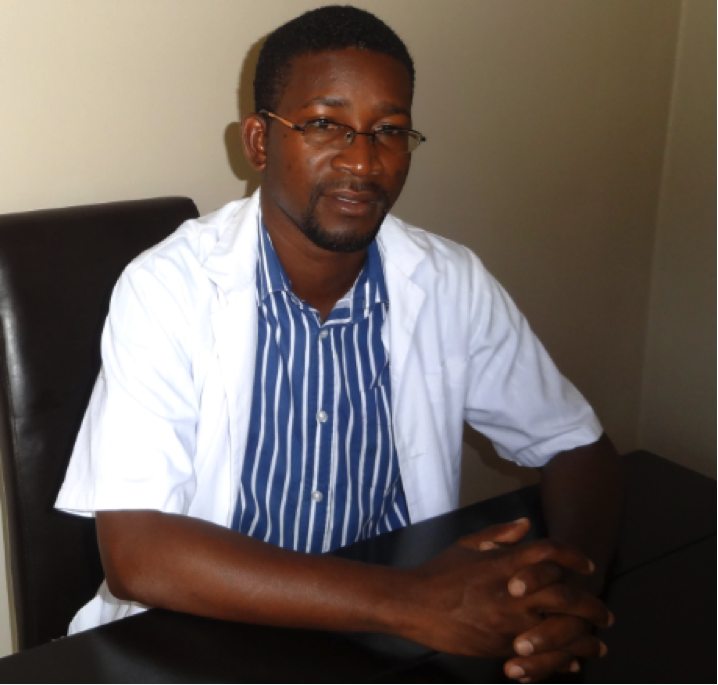UNC’s unique model of permanently based American faculty and training of Malawian medical professionals is improving healthcare for Malawians.


UNC Project Malawi Associate Country Director Innocent Mofolo, MSc, remembers a time not too long ago when Malawians would come to the Kamuzu Central Hospital in the capital city of Lilongwe for cancer testing. However, a lack of proper diagnostic equipment and pathologists hindered immediate results.
“Samples had to be sent to Blantyre for testing and the turnaround time was three months,” Mofolo says. “Often times, the results would come after the patient had died.”
But now the Kamuzu Central Hospital, or KCH, is home to a histopathology laboratory and a pathologist thanks to a partnership between the University of North Carolina Chapel Hill (UNC) and the Malawi Ministry of Health. Since 1999, UNC Project Malawi has been based at Tidziwe Centre on the campus of Kamuzu Central Hospital. “Tidziwe” is a Chichewa word meaning “We should find out.” It is a fitting name as UNC staff has worked hand in hand with Malawians to “find out” the most beneficial ways to treat and prevent disease as well as train healthcare professionals to make UNC Project Malawi sustainable. Instead of staffing the center with a rotating group of UNC health professionals, most UNC staff has lived in Malawi for a decade or more and work to train Malawians to treat their countrymen.
“Malawian health leaders, including myself, are very skeptical of ‘helicopter medicine,’” says Senior Research Manager Gift Kamanga, MSc, DrPH. “We desire something that is sincere for Malawi.”
For more than 20 years, UNC Project Malawi has provided research, care and training in Lilongwe. The program serves as a model for creating sustainable health services in a developing country.
Training the Local Professional
UNC Project Malawi Scientific Director Mina Hosseinipour, MD, MPH, moved to Malawi in August 2001 and has been working there full time ever since.
“Our training contributions to local investigators and clinicians is immense,” Hosseinipour says. “UNC has trained internal medicine specialists as well as obstetricians and gynecologists who are actively working and teaching the next generation of medical students from the Malawi College of Medicine as well as providing care on the wards. This strong base of clinicians, accompanied by the long term presence of UNC faculty, has allowed the development of in-country training programs for OB/GYN and can support the eventual expansion of medicine programs.”
As the interest in training increased, diverse funding sources were sought including support from Gilead Sciences, Inc. and the U.S. National Institutes of Health (NIH) Fogarty AIDS International Training and Research Program (AITRP). The partnership with AITRP began in 1998 and the Gilead Training Fellowship began in 2008. Both programs support Malawians pursuing health degrees or residency trainings, usually at universities outside of Malawi. Lameck Chinula, MMED, participated in the AITRP to train as an OB/GYN at the University of Cape Town in South Africa. He is now UNC Project Malawi’s first Malawian OB/GYN.
“UNC has managed to sponsor specialty training for Malawian healthcare professionals, and I am one of the beneficiaries,” Chinula says. “These professionals have come back and held leadership positions in government and at UNC Project Malawi. There is a feeling of ownership of programs being led by the local healthcare professionals.”
Cecilia Kanyama, MMED, also went through the AITRP to complete a medical residency at the University of Cape Town. She is an internal medicine physician and infectious diseases researcher at UNC Project Malawi. She also teaches at the University of Malawi College of Medicine.
“The local health professional has more in depth knowledge of their own community and are also respected and involved in different forums for policymaking locally; hence, they are best suited to use the skills and knowledge acquired to ensure best medical practices that are relevant to local systems in the country,” says Kanyama. “This approach prevents the unnecessary turnover of staff, which may lead to poor continuity of programs. In addition, the local health professionals trained are instrumental in training others in their community long term.”
Portia Kamthunzi, MMED, has spent the past seven years as a physician a UNC Project Malawi specializing in treating malaria and pediatric HIV as well as preventing mother to child transmission of HIV. She feels the collaboration among foreign and Malawian health professionals has greatly benefited both groups.
“The UNC approach is a good one as local healthcare professionals are provided with skills and knowledge to improve healthcare in their own community,” she says. “And local healthcare professionals, who are knowledgeable about the local problems, are in a better position to tackle public health care issues in their communities.”
Access to Free Clinical Care
UNC Project Malawi provides free clinical care to over 1,700 patients per week. Services include women’s health, pediatrics and infectious diseases management.
“I can say throughout my time at UNC Project Malawi that my work has greatly improved the health of Malawians,” says Kamanga, who serves as Head of Sexually Transmitted Infections (STI) Clinical Services. “I implemented the government policy of routine HIV testing to all patients who come in for STI treatment. Almost 8,000 people accessed HIV testing and counseling from my clinic. Anyone who tests positive is linked to antiretroviral therapy.”
Agnes Moses, MMED, witnessed the effect antiretroviral therapy access is having on Malawians firsthand. Like Kanyama, she completed the Gilead Training Fellowship and works as an internal medicine physician at UNC Project Malawi.
“During my first two years at the Project, I was leading the UNC initiated Preventing Mother to Child Transmission (PMTCT) program,” Moses says. “I had the pleasure of observing twins born to the first mother we gave nevirapine prophylaxis to within the program and her twins were born HIV-free. They are now 12-years-old.”
Moses’ specialty is cancer treatment. Another moment that stands out during her 13 years with UNC Project Malawi is the recovery of a man living with HIV and cancer.
“Four years ago I was running a cancer clinic at a referral hospital and we had a patient living with HIV and non-Hodgkin’s lymphoma,” Moses says. “He was treated with drugs donated by UNC and remains cancer-free.”
The Malawian health professionals also credit the acquisition of modern technology, like the use of digital X-rays in the radiology department, to improving clinical care.
“UNC Project Malawi has supported infrastructure development like the short-stay ward, and equipment like the first laparoscopy unit for the surgery department and a colposcopy unit for the OB/GYN department,” Mofolo says. “The partnership between UNC and the Malawi government is invaluable.”
Malawians Learn of Research Results
Results of research studies conducted at UNC Project Malawi continue to change treatment guidelines and inform healthcare policies. Hosseinipour specializes in HIV research including vaccines, injectable pre-exposure prophylaxis, prevention of mother to child transmission, treatment as prevention and management of opportunistic infections like Kaposi’s sarcoma.
“UNC Project Malawi research has directly influenced Malawian policies for treatment and prevention of HIV,” says Hosseinipour. “For example, findings from our Breastfeeding and Nutrition (BAN) study and the HIV Prevention Trial Network (HPTN) 052 study have directly influenced the expansion of antiretroviral therapy (ART) to mothers and the increase of CD4 threshold for ART initiation. These policy decisions have transformed the health of HIV infected individuals, essentially making HIV a manageable, chronic disease.”
Tisungane Mvalo realized the power of the work he was going in Malawi during a malaria study.[/caption] Tisungane Mvalo, MMED, remembers workings as the co-investigator of a previous malaria trial when he had the powerful realization that the research he was doing at the Project was providing the clinical care and management for 1,600 Malawian children on a 24-hour basis.
“With the 24-hour clinical care for these children provided, I had a feeling that we were improving the health outcomes for these children,” he says.
No matter what condition is being studied at UNC Project Malawi, research results are always shared and this transparency impresses Kamanga.
“Every year, UNC Project Malawi supports initiatives to disseminate health research in Malawi at the Malawi College of Medicine,” Kamanga says. “This is where the Project’s research results are disseminated first to Malawi, as the primary beneficiary. It is very satisfying for me as a Malawian to work with a partner to Malawi like UNC that is committed to the principle of genuine capacity building.”
